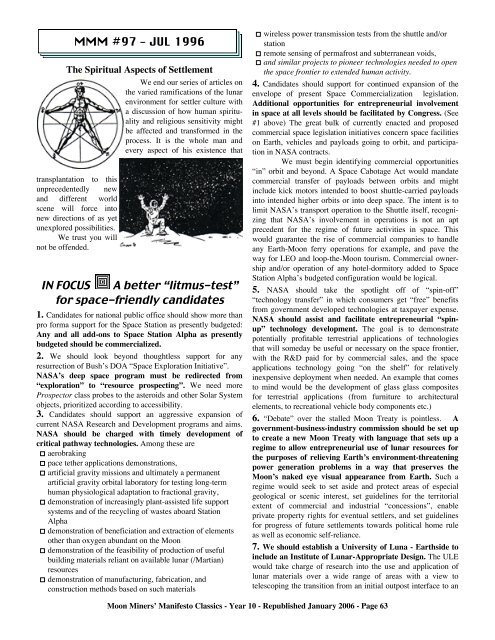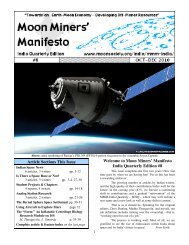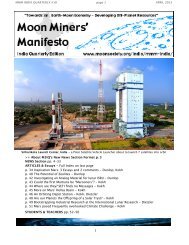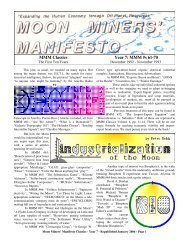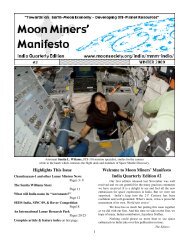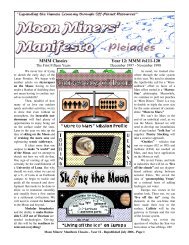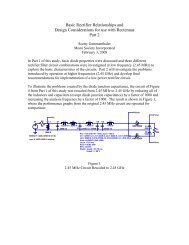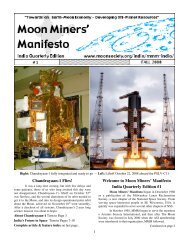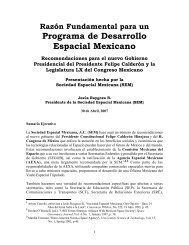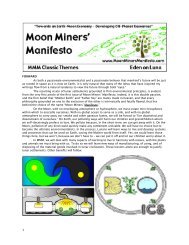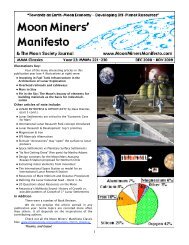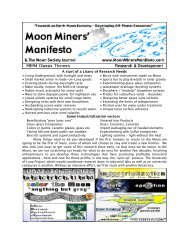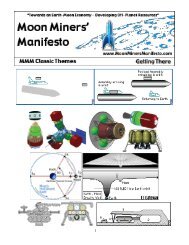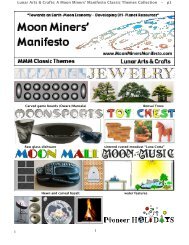MMM Classics Year 10: MMM #s 91-100 - Moon Society
MMM Classics Year 10: MMM #s 91-100 - Moon Society
MMM Classics Year 10: MMM #s 91-100 - Moon Society
Create successful ePaper yourself
Turn your PDF publications into a flip-book with our unique Google optimized e-Paper software.
<strong>MMM</strong> #97 - JUL 1996<br />
The Spiritual Aspects of Settlement<br />
transplantation to this<br />
unprecedentedly new<br />
and different world<br />
scene will force into<br />
new directions of as yet<br />
unexplored possibilities.<br />
We trust you will<br />
not be offended.<br />
We end our series of articles on<br />
the varied ramifications of the lunar<br />
environment for settler culture with<br />
a discussion of how human spirituality<br />
and religious sensitivity might<br />
be affected and transformed in the<br />
process. It is the whole man and<br />
every aspect of his existence that<br />
IN FOCUS A better “litmus-test”<br />
for space-friendly candidates<br />
1. Candidates for national public office should show more than<br />
pro forma support for the Space Station as presently budgeted:<br />
Any and all add-ons to Space Station Alpha as presently<br />
budgeted should be commercialized.<br />
2. We should look beyond thoughtless support for any<br />
resurrection of Bush’s DOA “Space Exploration Initiative”.<br />
NASA’s deep space program must be redirected from<br />
“exploration” to “resource prospecting”. We need more<br />
Prospector class probes to the asteroids and other Solar System<br />
objects, prioritized according to accessibility.<br />
3. Candidates should support an aggressive expansion of<br />
current NASA Research and Development programs and aims.<br />
NASA should be charged with timely development of<br />
critical pathway technologies. Among these are<br />
aerobraking<br />
pace tether applications demonstrations,<br />
artificial gravity missions and ultimately a permanent<br />
artificial gravity orbital laboratory for testing long-term<br />
human physiological adaptation to fractional gravity,<br />
demonstration of increasingly plant-assisted life support<br />
systems and of the recycling of wastes aboard Station<br />
Alpha<br />
demonstration of beneficiation and extraction of elements<br />
other than oxygen abundant on the <strong>Moon</strong><br />
demonstration of the feasibility of production of useful<br />
building materials reliant on available lunar (/Martian)<br />
resources<br />
demonstration of manufacturing, fabrication, and<br />
construction methods based on such materials<br />
wireless power transmission tests from the shuttle and/or<br />
station<br />
remote sensing of permafrost and subterranean voids,<br />
and similar projects to pioneer technologies needed to open<br />
the space frontier to extended human activity.<br />
4. Candidates should support for continued expansion of the<br />
envelope of present Space Commercialization legislation.<br />
Additional opportunities for entrepreneurial involvement<br />
in space at all levels should be facilitated by Congress. (See<br />
#1 above) The great bulk of currently enacted and proposed<br />
commercial space legislation initiatives concern space facilities<br />
on Earth, vehicles and payloads going to orbit, and participation<br />
in NASA contracts.<br />
We must begin identifying commercial opportunities<br />
“in” orbit and beyond. A Space Cabotage Act would mandate<br />
commercial transfer of payloads between orbits and might<br />
include kick motors intended to boost shuttle-carried payloads<br />
into intended higher orbits or into deep space. The intent is to<br />
limit NASA’s transport operation to the Shuttle itself, recognizing<br />
that NASA’s involvement in operations is not an apt<br />
precedent for the regime of future activities in space. This<br />
would guarantee the rise of commercial companies to handle<br />
any Earth-<strong>Moon</strong> ferry operations for example, and pave the<br />
way for LEO and loop-the-<strong>Moon</strong> tourism. Commercial ownership<br />
and/or operation of any hotel-dormitory added to Space<br />
Station Alpha’s budgeted configuration would be logical.<br />
5. NASA should take the spotlight off of “spin-off”<br />
“technology transfer” in which consumers get “free” benefits<br />
from government developed technologies at taxpayer expense.<br />
NASA should assist and facilitate entrepreneurial “spinup”<br />
technology development. The goal is to demonstrate<br />
potentially profitable terrestrial applications of technologies<br />
that will someday be useful or necessary on the space frontier,<br />
with the R&D paid for by commercial sales, and the space<br />
applications technology going “on the shelf” for relatively<br />
inexpensive deployment when needed. An example that comes<br />
to mind would be the development of glass glass composites<br />
for terrestrial applications (from furniture to architectural<br />
elements, to recreational vehicle body components etc.)<br />
6. “Debate” over the stalled <strong>Moon</strong> Treaty is pointless. A<br />
government-business-industry commission should be set up<br />
to create a new <strong>Moon</strong> Treaty with language that sets up a<br />
regime to allow entrepreneurial use of lunar resources for<br />
the purposes of relieving Earth’s environment-threatening<br />
power generation problems in a way that preserves the<br />
<strong>Moon</strong>’s naked eye visual appearance from Earth. Such a<br />
regime would seek to set aside and protect areas of especial<br />
geological or scenic interest, set guidelines for the territorial<br />
extent of commercial and industrial “concessions”, enable<br />
private property rights for eventual settlers, and set guidelines<br />
for progress of future settlements towards political home rule<br />
as well as economic self-reliance.<br />
7. We should establish a University of Luna - Earthside to<br />
include an Institute of Lunar-Appropriate Design. The ULE<br />
would take charge of research into the use and application of<br />
lunar materials over a wide range of areas with a view to<br />
telescoping the transition from an initial outpost interface to an<br />
<strong>Moon</strong> Miners’ Manifesto <strong>Classics</strong> - <strong>Year</strong> <strong>10</strong> - Republished January 2006 - Page 63


